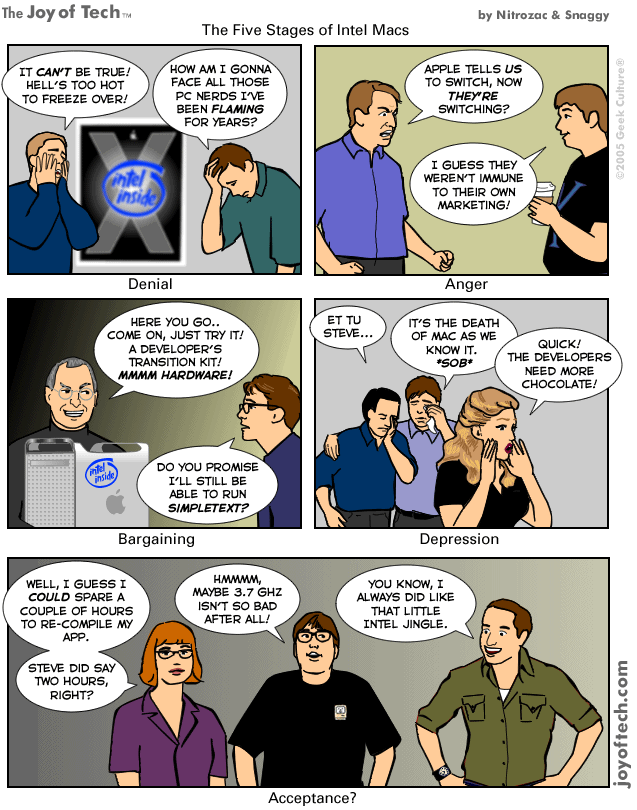jeb1138
Carioca
http://arstechnica.com/columns/mac/mac-20050607.ars/1
Fantastic article on the passing of the Power PC by Siracusa of arstechnica.
Also a very informative Q&A at the end.
Good read for the Mac faithful. And it's not despairing! Just some appropriate mourning for a beloved lost friend and a healthy, optimistic look at the future. A quote:
Fantastic article on the passing of the Power PC by Siracusa of arstechnica.
Also a very informative Q&A at the end.
Good read for the Mac faithful. And it's not despairing! Just some appropriate mourning for a beloved lost friend and a healthy, optimistic look at the future. A quote:
John Siracusa said:Ever since (ironically) IBM chose Intel and Apple chose Motorola at the dawning of the PC era in the early 1980s, Apple has been swimming upstream to get its CPUs. As the dominance of "IBM compatible" and (later) Windows PCs has increased, the total resources dedicated to making competitive CPUs for Apple has dwindled. Still, until now, Apple has chosen to go its own way.
Sometimes there can be an advantage to doing thistechnical, philosophical, or even just in terms of marketing. Apple has certainly reaped the rewards of this approach, enjoying brief stints at the top of the PC performance heap, emphasizing Apple's differentiation through its use of "exotic" CPUs, and generally getting to make more interesting technical choices than the traditionally conservative market leader (choosing to move to the PowerPC, emphasizing AltiVec, etc.) As an added bonus, they even got to avoid potentially harmful direct comparisons to their competitors thanks to the subtleties inherent in evaluating the relative performance of entirely different CPU architecturessubtleties that are far, far beyond the average consumer's understanding.
Apple's been hit by the downsides too, of course. Fewer resources behind each CPU line can mean higher prices, technical stagnation, and CPUs that are not designed primarily to meet Apple's needs. So here we are at the end of that road. It was a valiant effort, but Apple has thrown in the towel.
Apple was never a CPU maker. Now Apple's also out of the business of trying to motivate, all on its own, the creation of CPUs that are capable of competing with those designed for and by "the other 95%" of the PC market. That was always a tough business to be in, so the sentiment expressed by Adobe CEO Bruce Chizen is understandable: "What took you so long?"
A broken heart
Despite all the interesting possibilities for the future (which I'll get to in a bit), I'm saddened by this turn of events. Everything that was captivating and exotic about Apple's CPUs added up to little more than a few brief moments of glory in the market and a handful of trips to the top of the performance heap. But to silicon-loving geeks, it really meant something.

